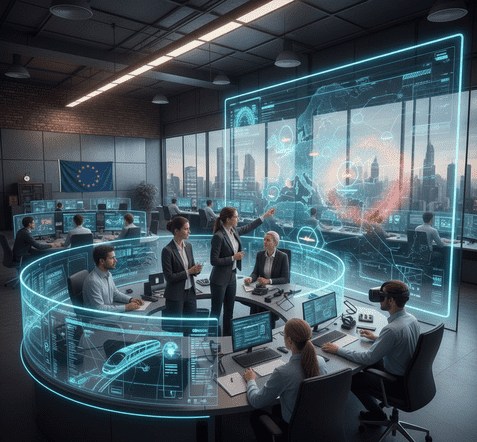The Link Between AI Training Programs and Smart City Development
As cities grow smarter, Artificial Intelligence (AI) is emerging as the backbone of urban innovation. From intelligent traffic systems to predictive healthcare and efficient energy grids, AI technologies are transforming how cities operate.
However, the success of these smart city initiatives depends not only on technology — but on people. Skilled professionals, trained through structured AI training programs, are essential to design, deploy, and manage AI-driven urban ecosystems.
This article explores how AI training programs empower professionals to lead smart city transformations, the importance of working with an authorized training partner, and how organizations can become a partner in advancing the global smart city vision.
How AI Shapes Smart City Development
AI plays a critical role in making cities more connected, sustainable, and efficient. From optimizing public transportation to enhancing waste management and public safety, AI-driven systems turn data into actionable insights.
Key applications include:
- Traffic optimization: AI algorithms manage congestion and reduce emissions.
- Energy management: Predictive systems optimize electricity usage.
- Public safety: Facial recognition and predictive policing improve response times.
- Smart governance: Chatbots and automation enhance citizen engagement.
To build and sustain these innovations, cities need trained AI professionals who can create scalable, secure, and ethical systems — making AI training programs a national priority.
The Role of AI Training Programs in Smart City Success
1. Building an AI-Ready Workforce
Smart cities run on intelligent data systems — but data is only as good as the experts who manage it. AI training programs prepare engineers, policymakers, and city planners to use AI for real-world problem-solving.
They cover:
- Machine learning and data analytics.
- IoT integration for urban infrastructure.
- AI-driven decision-making and automation.
This upskilling ensures cities have the local talent needed to build and maintain their AI-powered systems.
2. Bridging Technology and Governance
AI transforms governance by improving decision-making through data insights. However, for city officials and administrators to fully leverage AI, they must understand its principles and limitations.
Through targeted AI training programs, governments can upskill their workforce to interpret AI outputs, ensure ethical governance, and align innovation with citizen needs.
3. Fostering Innovation and Collaboration
Training builds ecosystems of innovation. When universities, enterprises, and governments collaborate with an authorized training partner, they create standardized, high-quality learning paths that foster collaboration between public and private sectors.
This ensures smart city initiatives aren’t fragmented — but unified under shared goals and certified expertise.
The Role of Authorized Training Partners
Becoming an authorized training partner bridges the gap between education and implementation.
Organizations like AI CERTs provide global certification programs that ensure AI professionals meet international standards.
Authorized partners benefit from:
- Access to certified AI learning content aligned with global frameworks.
- Support for large-scale government and enterprise training.
- Accreditation that builds credibility and trust.
- Collaboration opportunities in national and regional AI projects.
For institutions aiming to make a tangible impact in smart city growth, become a partner with AI CERTs to deliver globally recognized AI education.
Case Studies: Smart Cities Empowered by AI Training
- Singapore: Known as one of the smartest cities in the world, Singapore invests heavily in AI upskilling through government-accredited training programs, ensuring every sector is digitally empowered.
- Dubai: Under its Smart Dubai initiative, thousands of professionals have undergone AI training to support intelligent governance and smart mobility solutions.
- Barcelona: The city’s Urban Lab initiative partners with academic and corporate bodies to promote AI-based urban development.
These examples show that smart cities are not just built with technology — they’re built with talent.
AI CERTs: Partnering for Smarter Cities
AI CERTs helps organizations, governments, and educational institutions build the workforce behind smart city transformation.
Its globally aligned AI training programs provide recognized certifications that ensure professionals meet international AI competency standards.
By working with AI CERTs as an authorized training partner, institutions can:
- Scale AI learning across regions.
- Support national and municipal AI strategies.
- Contribute to sustainable urban innovation.
Smart cities thrive on collaboration — and AI CERTs provides the bridge between global expertise and local implementation.
Conclusion: Building the Future, One Smart City at a Time
AI is the engine of smart cities — but people are the drivers. Through AI training programs, professionals gain the skills needed to design smarter, safer, and more connected urban environments.
Whether you’re a government institution, university, or corporate leader, partnering with an authorized training provider like AI CERTs ensures your teams are equipped to lead tomorrow’s digital cities.
👉 Ready to shape the cities of the future?
Explore AI CERTs Certifications or Become an Authorized Partner today.
Recent Blogs

FEATURED
EU’s Cyber-Rail Hands-On Training Is a New Model for Sector-Targeted AI Partners
February 14, 2026
FEATURED
Per Scholas Job Placement Success Shows Certified Training Can Drive Real Outcomes
February 14, 2026
FEATURED
Why U.S. Organizations Are Struggling to Train Entry-Level Workers on AI and How Partnerships Fix It
February 14, 2026
FEATURED
New Federal AI Skills Tax Credit Could Make Enterprise Training Partnerships Irresistible
February 14, 2026
FEATURED
How AI Training Data Deals (Like Robo.ai’s) Highlight New Workforce Needs
February 13, 2026

